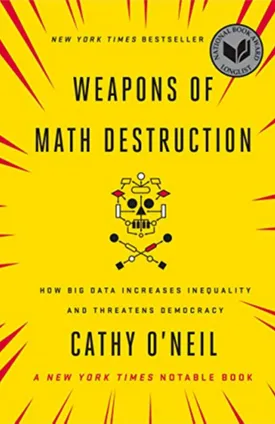Weapons of Math Destruction: How Big Data Increases Inequality and Threatens Democracy by Cathy O'Neil
In her book Weapons of Math Destruction, Cathy O’Neil warns of the dangers posed by the increasing use of Big Data. According to O’Neil, algorithms, propelled by Big Data, are being used to make decisions about our lives without our knowledge or consent. Furthermore, based on her research, O’Neil argues that these algorithms have been found to unintentionally amplify existing inequalities in our society. This threat to democracy, she contends, could be the unintended consequence of our reliance on Big Data and its algorithms.
We live in an era of Big Data where data is collected, stored and analyzed to produce insights that are used to shape the world around us. Big Data has been utilized in a variety of sectors, such as government, education, finance, healthcare and retail. It has been increasingly praised for its capacity to automate decision-making, find new solutions to complicated problems, and generate large amounts of consumer information.
But along with the numerous benefits of Big Data comes the potential for misuse. O’Neil argues that algorithms, which are used to make decisions based on data, have the potential to create further inequality through its automated judgments. The algorithms have become involved in a wide range of activities, such as profiling people for employment or consumer preferences. Their decisions may be effective in managing the dataset, but their accuracy and fairness are often uncertain.
In addition, O’Neil argues that these algorithms affect significant life outcomes for many, such as determining an individual’s employability, likelihood of being accepted for a loan, or determining one’s sentencing in a criminal case. Furthermore, these decisions have a larger implication on our society, as they further exacerbate existing inequalities between groups. Many of the algorithms can unknowingly reinforce racial, gender and age prejudice by their unconstrained judgments.
For example, one of O’Neil’s case studies revolves around the use of algorithms in banking decisions. Particular algorithms have been found to disproportionately deny loans to black and Hispanic borrowers, regardless of their creditworthiness. Therefore, these algorithms are inadvertently discriminating against these populations as they are unable to secure credit – ultimately reinforcing existing economic inequality.
O’Neil’s research thus highlights the dangers posed by Big Data and its algorithms. According to O’Neil, the algorithms used to produce predictive results have the potential to exacerbate existing inequalities and unwittingly discriminate against minority groups. O’Neil’s book is a reminder of the need for further consideration and regulation in the handling of Big Data, as it continuously begins to shape our lives and our democratic society.

